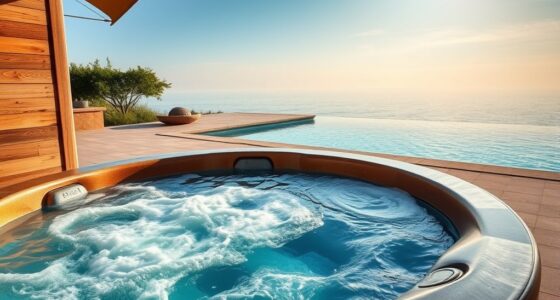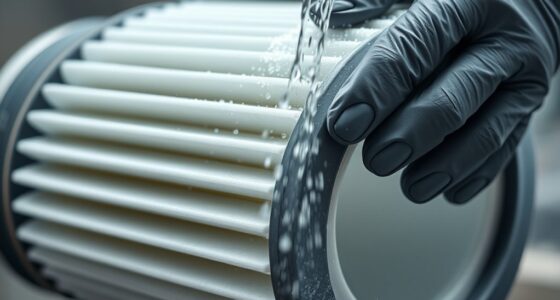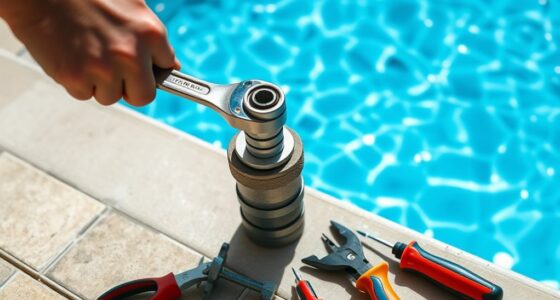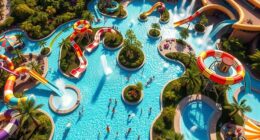Discover the truth behind common pool myths, from water chemistry to safety and equipment. You might think chlorine is enough or that deeper pools are always safer, but many beliefs are misconceptions. Proper maintenance, safety barriers, and equipment use are essential for a safer, cleaner pool. By understanding water balance, safety features, and energy-efficient options, you’ll keep your pool in top shape. Keep exploring to learn the facts that can save you time, money, and frustration.
Key Takeaways
- Proper water chemistry, including alkalinity and pH balance, is essential to prevent cloudy water and equipment damage.
- Chlorine effectiveness depends on correct pH levels and regular testing to ensure sanitation.
- Safety barriers and correct pool depth markings are crucial to prevent accidents and ensure pool safety.
- Regular equipment maintenance and seasonal water treatment protect pool systems and reduce long-term costs.
- Understanding different cover types helps maximize energy savings, safety, and water quality maintenance.
Myths About Pool Water Chemistry
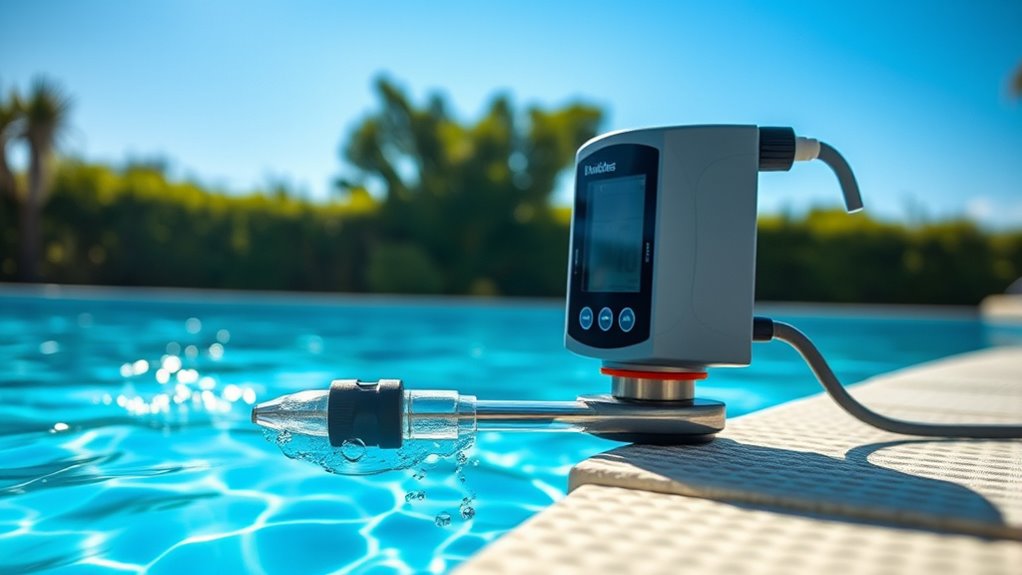
Many pool owners believe they can simply add chlorine and forget about balancing other chemicals, but this is a myth. Proper pool water chemistry requires maintaining the alkalinity balance first, which stabilizes pH levels and prevents fluctuations. If alkalinity is too low, pH can become unpredictable, leading to cloudy water and corrosion. Conversely, high alkalinity makes pH adjustments more difficult and can cause scaling. Regular testing helps you monitor these levels, allowing you to make precise pH adjustments as needed. Keeping the alkalinity balanced ensures your pH stays within the ideal range, making chemical management easier and more effective. Neglecting this step can lead to costly problems, so don’t overlook the importance of consistent alkalinity and pH control in your pool maintenance routine. Additionally, understanding the role of essential oils for water clarity can help maintain a healthier and more comfortable swimming environment.
The Truth About Chlorine and Sanitizers
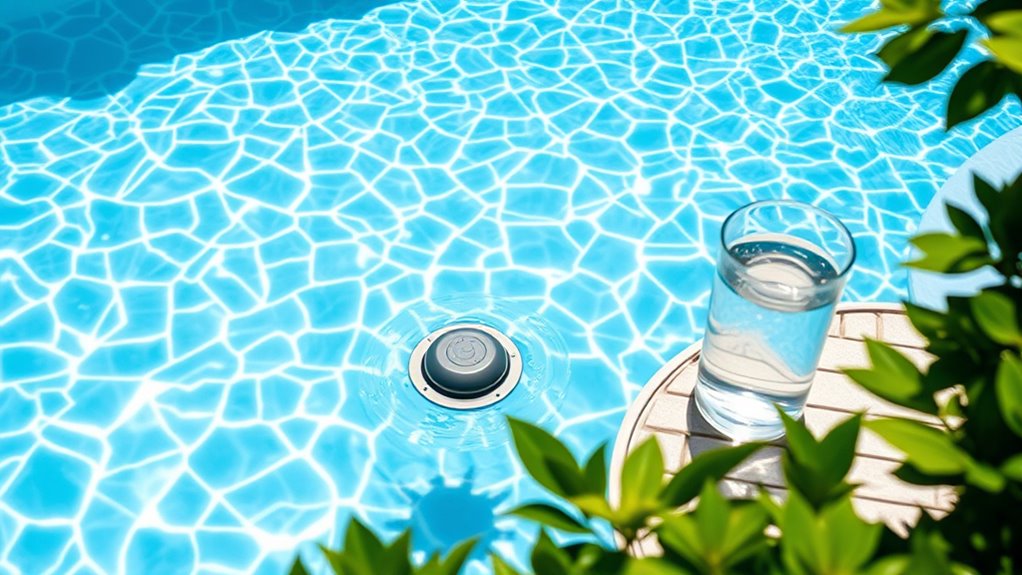
Chlorine and other sanitizers are essential for keeping your pool safe, but there’s a common misconception that adding chlorine alone guarantees clean water. In reality, maintaining sanitizer safety and maximizing chlorine effectiveness requires more than just dosage. Here’s what you need to know:
- Proper pH levels boost chlorine effectiveness.
- Regular testing ensures sanitizer concentrations stay ideal.
- Shock treatments help eliminate chloramines that reduce sanitizer efficiency.
- Using stabilizers like cyanuric acid protects chlorine from sunlight degradation.
- Staying informed about AI advancements can assist in monitoring and optimizing pool water quality.
Additionally, understanding the causes of imbalanced water chemistry can help prevent issues before they arise, ensuring your pool remains in optimal condition. Proper water chemistry balance is crucial for maintaining effective sanitation and preventing harmful bacteria growth. Incorporating advanced filtration technologies can further enhance overall water clarity and safety. Employing predictive analytics and AI-driven monitoring tools can enable proactive maintenance, saving time and resources. Relying solely on chlorine isn’t enough; balancing chemical levels ensures sanitizer safety and keeps your water crystal clear. Understanding these factors prevents common issues like algae growth and cloudy water. When used correctly, chlorine remains a powerful tool for safe, clean pools—without risking overuse or ineffective sanitation.
Debunking the “Pool Closing” Misconceptions
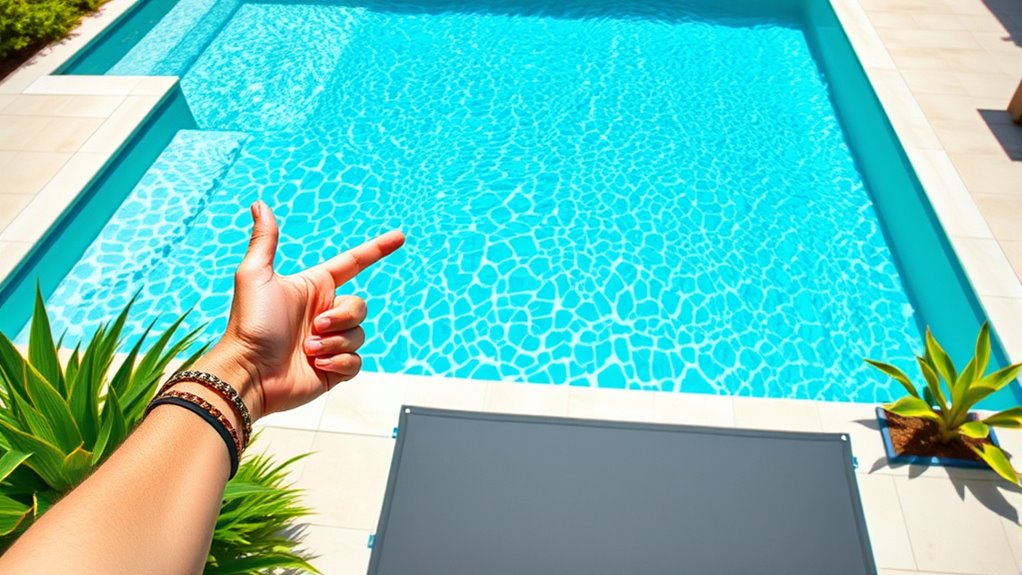
Many believe closing your pool each season means neglecting maintenance until spring, but proper equipment upkeep guarantees it stays in top shape year-round. Seasonal water treatment isn’t just for shutdown; it helps maintain water clarity and reduces long-term costs. Understanding these misconceptions can save you time and money, making your pool easier to manage. Regular pool maintenance throughout the year is essential to prevent issues and extend the lifespan of your equipment. Proper cleaning and inspections can prevent clogged filters and other problems that might arise from neglecting routine care. Additionally, maintaining consistent water chemistry ensures optimal performance of your pool’s components and prevents costly repairs. Incorporating year-round care strategies can also improve your pool’s overall efficiency and lifespan.
Proper Equipment Maintenance
Proper equipment maintenance is essential to keeping your pool in top condition, even during the off-season. Neglecting it can lead to costly repairs and poor water quality when you reopen. Focus on these key steps:
- Regular filter maintenance keeps debris out and ensures proper water flow.
- Check and clean skimmer baskets to prevent clogs.
- Maintain proper chemical balancing to inhibit algae growth and bacteria.
- Inspect pool equipment for wear, leaks, or corrosion.
- Incorporate rustic decor and natural materials in your poolside area to enhance the farmhouse aesthetic. Additionally, understanding pool safety regulations can help prevent accidents and ensure a safe environment around your pool.
Seasonal Water Treatment
Some pool owners believe that closing their pool for the season means you can neglect water treatment entirely. That’s a myth. Seasonal water treatment is still essential to prevent algae growth, corrosion, and scale buildup during the off-season. Proper pool water balance helps protect your equipment and keeps the water clean for the next swim season. Before closing, you should adjust pH, alkalinity, and sanitizer levels, and consider using a winterizing chemical kit. Even if you’re not using the pool, circulating and maintaining the right chemical balance prevents stagnation and costly repairs later. Skipping seasonal water treatment can lead to more work and expenses when reopening. Properly managing pool water balance now ensures your pool stays healthy and ready for use when the season resumes.
Long-Term Cost Savings
Skipping seasonal water treatment might seem like a way to save money, but in reality, it can lead to higher long-term costs. Poor maintenance causes damage and increases repair expenses, which can outweigh initial savings. Proper maintenance budgeting and cost analysis reveal that:
- Neglecting water balance can lead to equipment corrosion.
- Ignoring filter cleaning raises energy consumption.
- Skipping routine inspections shortens equipment lifespan.
- Delaying chemical treatments results in costly repairs.
- Using appropriate tea kettles ensures precise temperature control, preventing damage and reducing energy waste.
- Regular water treatment and preventative maintenance can help avoid expensive repairs and prolong the lifespan of pool equipment.
Additionally, understanding your cookie categories and managing user consent can contribute to better website maintenance practices, ensuring optimal performance and user experience. Incorporating proper airflow around pool equipment can also enhance its performance and longevity, further reducing maintenance costs. Proper equipment placement and ventilation are essential for maintaining optimal operating temperatures and preventing overheating, which can lead to costly repairs and replacements.
Common Beliefs About Pool Maintenance and Cleaning
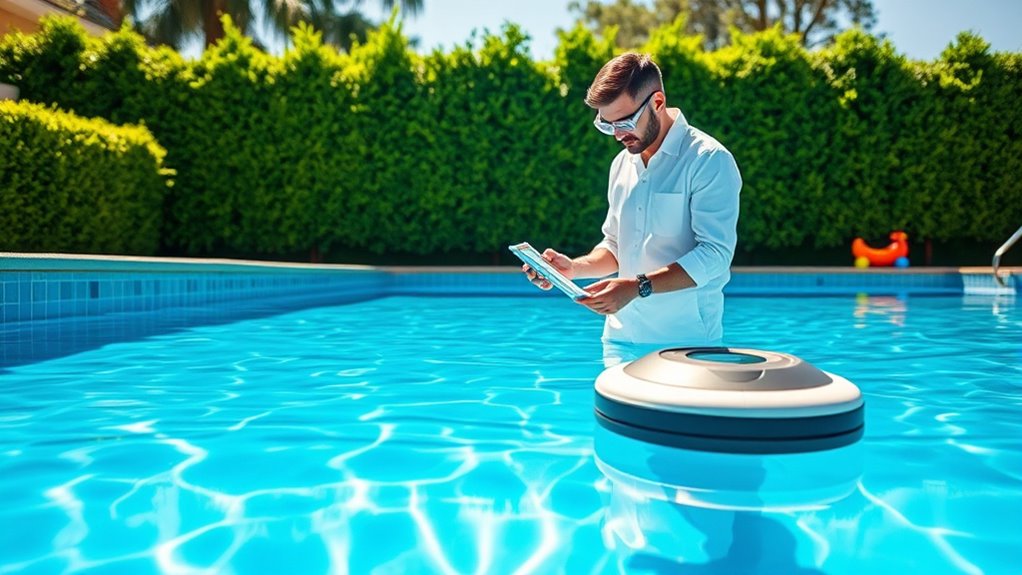
Many people believe that maintaining a clean pool is as simple as skimming the surface once a week. However, this overlooks issues like pool algae and water evaporation, which affect water quality and levels. Regular cleaning and proper chemical balance prevent algae blooms and keep your water clear. Water evaporation requires you to top off your pool regularly, especially during hot months, to maintain proper water levels. Simply skimming won’t address these deeper concerns. Use a pool cover to reduce evaporation and algae growth. Additionally, understanding the importance of chemical maintenance helps ensure the water remains balanced and safe for swimming. Incorporating glycolic acid in pool maintenance routines can enhance water clarity by helping to break down organic buildup and improve overall water quality. Maintaining proper water testing routines is essential for consistent water health and safety, and staying informed about common pool issues can help you troubleshoot problems more effectively. Moreover, using appropriate filtration methods can significantly improve water circulation and clarity.
Myths Surrounding Pool Safety and Depths
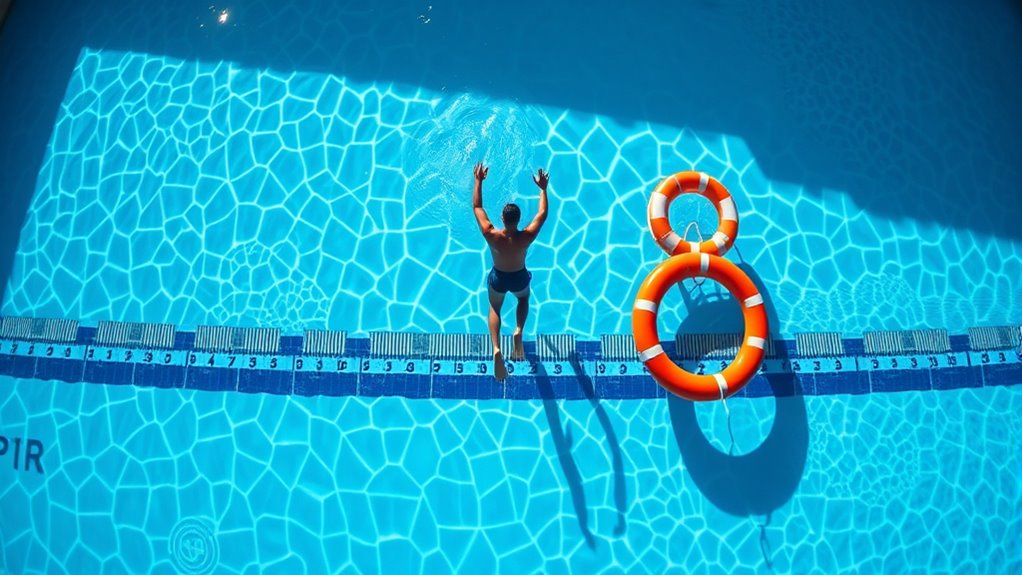
There are several misconceptions about pool safety and depth that can put swimmers at risk. Many believe that shallow pools eliminate drowning hazards or that all pools are equally safe. However, understanding the truth is essential:
- Shallow pools aren’t foolproof; a sudden fall or slip can still cause injuries. It’s also important to recognize that safety features vary among pools and can impact overall safety. Additionally, pool safety standards differ depending on location and facility, affecting safety measures.
- Deeper doesn’t mean safer; it’s more about proper supervision and safety measures.
- Pool depth varies; always check for marked depths before diving.
- Safety barriers are vital; they prevent accidental falls and restrict access to unsupervised children.
- Accurate information about pool features helps in making informed safety decisions and avoiding misconceptions about pool safety.
Knowing the actual pool depth and installing sturdy safety barriers greatly reduce accidents. Never assume safety based solely on shallow water—stay vigilant and prioritize proper safety measures.
The Reality of Pool Equipment and Energy Use
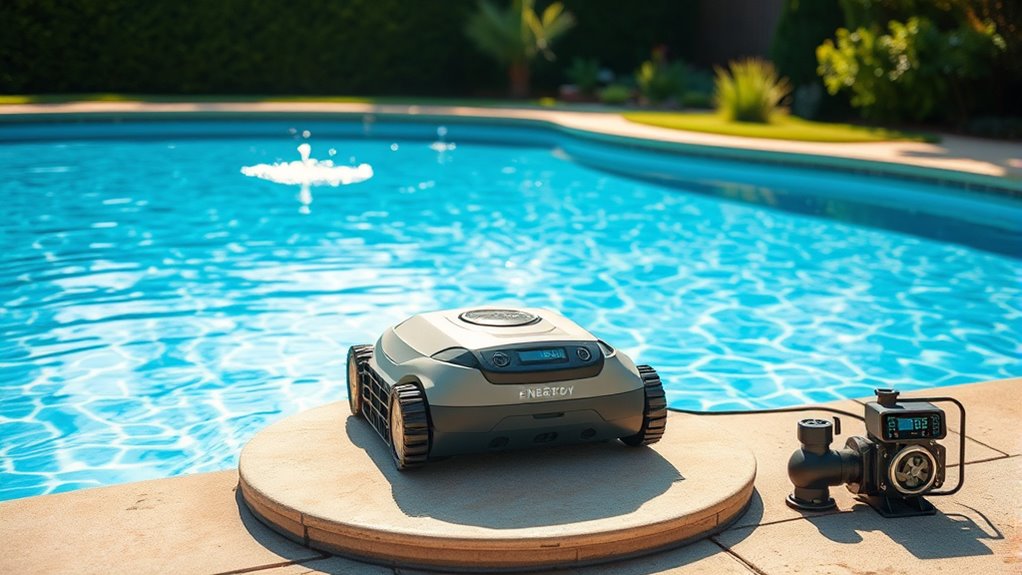
Many pool owners believe that high energy costs are unavoidable, but choosing the right equipment can make a big difference. Energy-efficient pumps can cut your electricity bills without sacrificing performance. Plus, misconceptions about pool heaters often lead people to overestimate their energy use; in reality, modern heaters are more efficient than you might think. Proper system design and installation also play a crucial role in optimizing energy consumption and reducing costs. Additionally, understanding energy-efficient technology behaviors can help in recognizing potential issues with trust and honesty.
Energy-efficient Pump Options
Choosing an energy-efficient pool pump can substantially reduce your electricity bills and environmental impact. Modern options like variable speed pumps are designed to optimize energy use by adjusting flow rates based on your needs. Here are four benefits of choosing an energy-efficient pump:
- Lower energy consumption, saving you money
- Quieter operation for a more peaceful environment
- Longer lifespan due to reduced wear and tear
- Better flow control with adjustable speeds
Variable speed pumps are especially effective because they run at lower speeds during routine filtration, which markedly cuts energy use. Investing in energy-efficient equipment not only benefits your wallet but also supports eco-friendly practices, making your pool operation smarter and more sustainable.
Misconceptions About Pool Heaters
Despite common beliefs, pool heaters aren’t as energy-draining as some think. Many assume electric heating units consume excessive power, but modern models are more efficient than ever. Solar heating systems, in particular, offer an eco-friendly alternative, harnessing the sun’s energy to warm your pool with minimal operational costs. While electric heaters can be effective, they may use more energy if not properly sized or maintained. The key is choosing the right system for your needs and optimizing its use. Proper insulation, regular maintenance, and timing your heating can markedly reduce energy consumption. Remember, with the right setup, pool heating becomes a manageable expense, dispelling the myth that keeping your pool warm must drain your wallet.
Misunderstandings About Pool Covering and Cover Types
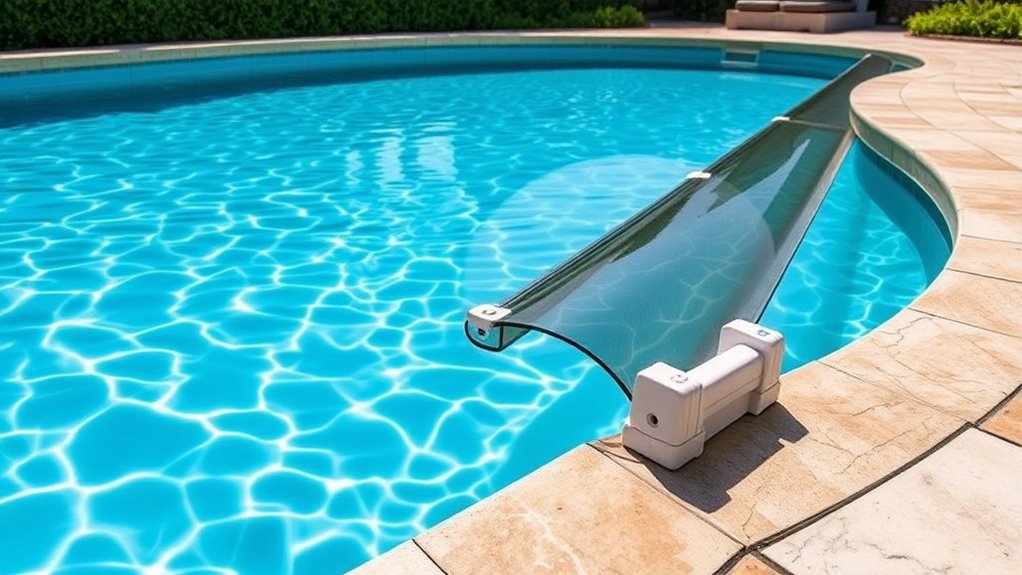
There are several common misconceptions about pool covers and the different types available, which can lead to improper use or choosing the wrong cover for your needs. Many assume all covers are the same, but understanding cover types can maximize their benefits. Here are some key points:
Understanding different pool cover types maximizes benefits and prevents misconceptions.
- Safety covers are strong and prevent accidents, not just keep debris out.
- Solar covers boost heat retention and reduce energy costs.
- Automatic covers offer convenience but may be costly upfront.
- Standard winter covers protect against debris but don’t insulate or heat the pool.
Knowing these cover types helps you select the right one, ensuring you enjoy their full cover benefits—like energy savings, safety, and reduced maintenance. Choosing the proper cover enhances your pool experience and longevity.
Frequently Asked Questions
Can Pool Myths Affect How I Handle Water Safety?
Yes, pool myths can influence how you handle water safety. Believing false ideas might lead you to overlook important safety measures or ignore water quality issues. Staying informed through safety education helps you recognize the truth and avoid misconceptions. By understanding proper pool maintenance and safety tips, you can guarantee a safer swimming environment for yourself and others, reducing risks and promoting responsible pool use.
Are There Hidden Costs Associated With Common Pool Myths?
Like a shadow lurking, hidden costs can sneak in when you fall for maintenance myths. These misconceptions often lead you to overlook hidden fees, such as unnecessary repairs or overpaid chemicals. By believing these myths, you might spend more than needed, draining your budget faster than you’d expect. Stay informed and question common pool myths to avoid these costly surprises. Knowledge keeps your pool safe and your wallet intact.
How Do Pool Myths Influence Seasonal Maintenance Routines?
You might find that pool myths influence your seasonal maintenance routines by leading to chemistry misconceptions and equipment misunderstandings. Believing false facts, like using too much chlorine or neglecting filter cleaning, can cause more harm than good. These misconceptions prompt you to alter routines unnecessarily, wasting time and money. To keep your pool in top shape, rely on accurate info, and avoid falling for myths that disrupt your proper maintenance schedule.
What Misconceptions Impact Pool Investment Decisions?
In the age of dial-up internet, misconceptions about pools can lead you astray. You might think investing heavily in a pool cover is unnecessary or that maintaining perfect chemical balance is overly complicated. These myths can cause you to overspend or neglect essential care. In reality, a good pool cover saves money and conserves energy, while proper chemical balance guarantees safety and longevity. Debunking these myths helps you make smarter investment choices.
Do Myths About Pool Depths Affect Safety Regulations?
Myths about pool depths can influence how pool design aligns with safety regulations, but legal standards are based on actual safety data, not misconceptions. You should understand that safety regulations focus on specific depth requirements to prevent accidents. While myths might mislead your perceptions, adhering to established legal standards guarantees your pool is safe. Always consult professionals to design your pool according to the correct depth guidelines, avoiding the influence of false beliefs.
Conclusion
So, next time someone insists you need a PhD to understand pool maintenance, remind them that most pool myths are just splashy tales. With a little knowledge, you’ll see through the bubbles of misinformation and enjoy your pool without unnecessary fuss or fear. After all, who needs science when you’ve got good old common sense—and maybe a floatie or two? plunge in, debunk myths, and make a splash with confidence!


